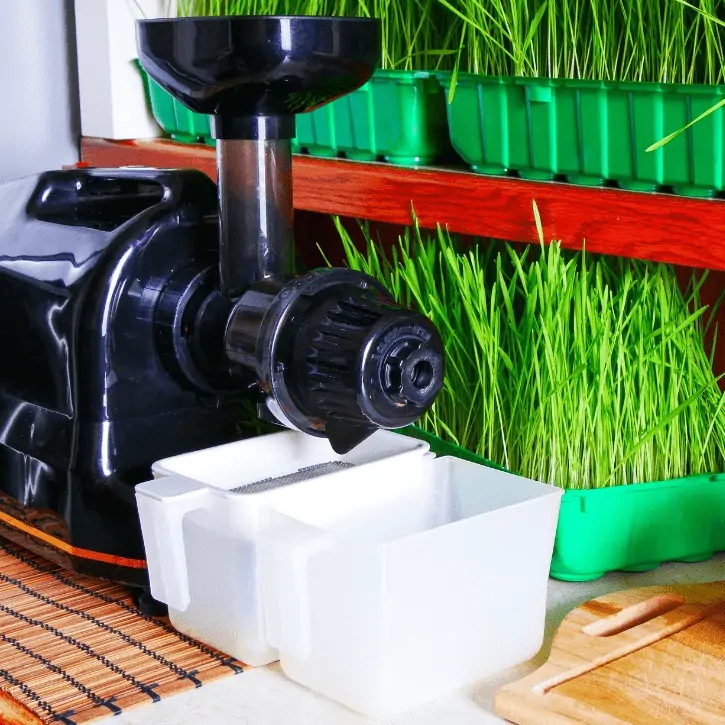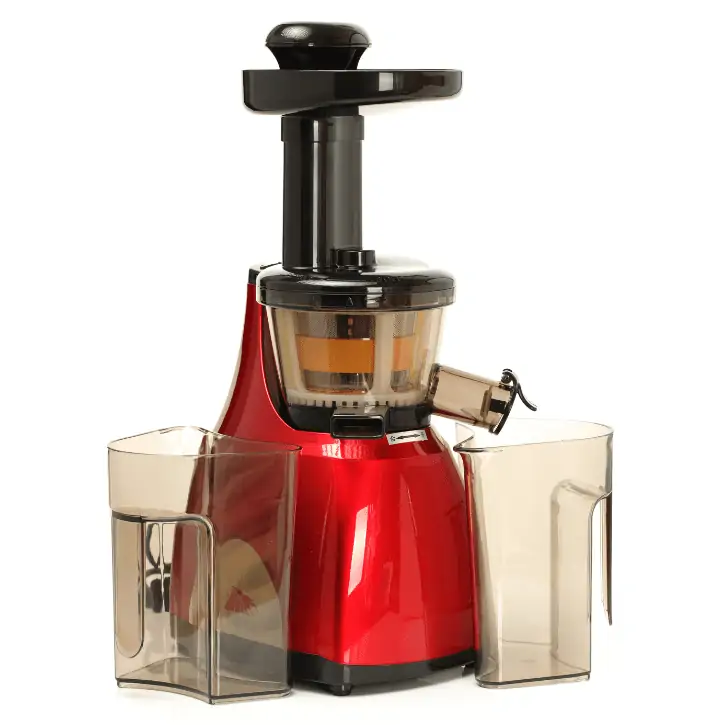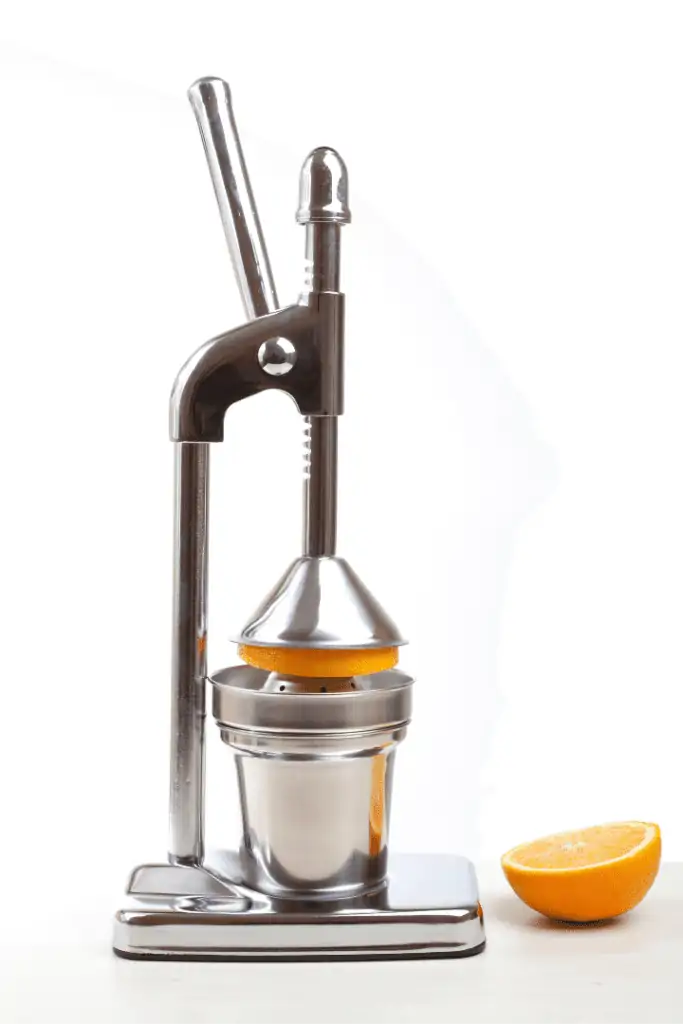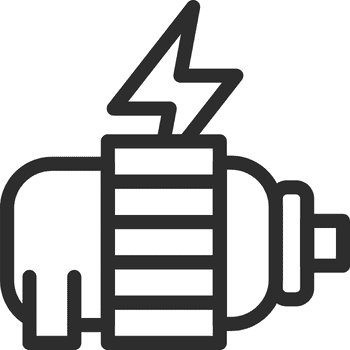Although fresh juice can be healthy and refreshing, the benefits often don’t feel worthwhile once you hear how noisy a juicer can be. Luckily, choosing the quietest juicer that doesn’t sacrifice quality is easier than you might expect.
So, let’s look into the world of quiet juicers to see what sort of products are available. Hopefully, by the end, you’ll have the perfect juicer for your low-noise needs!
How Many dB is a Juicer?
Before looking at the products, it’s worth asking, is a juicer noisy?
A standard juicer can produce between 80 and 90dB of noise. In real terms, this is somewhere between a truck driving past and the noise emitted by power tools, such as a belt sander.
Quiet juicers, on the other hand, will typically max out at about 60dB. This is equivalent to normal conversation volume. However, we could consider anything below 80dB to be a “quiet” juicer compared to standard noise emissions.
Where possible, we’ll keep these noise levels in mind when reviewing the products below.
Our Top 5
My top picks for quietest juicers focus on masticating juicers and centrifugal juicers primarily. Along with noise level, I’ll also consider ease of use (particularly how easy the juicer is to clean!).
1. Top Pick: Jocuu Slow Masticating Juicer
- Type: Masticating Juicer
- Max RPM: 110
- Power: 150 W
- Speed Settings: 2
- Juice Yield: 95% max
- Warranty: 4 yrs
The Jocuu juicer is my top pick because its noise level maxes out at 60dB. While it’s not extremely quiet, it’s still low enough that it shouldn’t cause too much bother. You can check out this video for a demonstration of its noise levels and juicing speed.
It’s on the quieter side because it has a slow masticating motor with 2 speed settings. Its highest RPM is 110, which is slower than a centrifugal juicer. Although it’ll take longer, it produces a higher juice yield – up to 95% – and reduces oxidation. To put this 95% juice yield rate into perspective, it’s among the highest you can expect from a masticating juicer.
Usefully, it’s quick to take apart and is dishwasher safe. There’s also a reverse function that helps you get rid of pulp and reduce the chances of it clogging. Its motor has a 20-minute shut-off function to improve lifespan, but you also get a 4-year warranty.
Its biggest downside is that its input opening is quite small, meaning you have to chop larger fruit and veg before juicing. However, this does also help the slower motor deal with hard veg, so it’s not a massive issue.
- Noise level of 60dB.
- Can deal with hard veg (such as carrots).
- Easy to disassemble and clean.
- Opening is quite small.
2. Top Budget Pick: Bonsenkitchen Cold Press Juicer
- Type: Masticating Juicer
- Max RPM: 80
- Power: 150 W
- Speed Settings: 2
- Juice Yield: 90% max
- Warranty: 1 yr
The Bonsenkitchen juicer also operates at 60dB but is significantly cheaper than the Jocuu. While this is helpful if you’re looking to save money, it does result in lower build quality. However, according to users, it still does a good job of juicing fruit and veg.
It’s another slow juicer, and its maximum RPM is 80. This is slower than the Jocuu, meaning it’ll take longer to juice. However, if you’re looking for an inexpensive and quiet appliance, it’s a fair compromise. As you can tell from this video, its noise levels and juicing speed aren’t too dissimilar to the Jocuu.
It’s easy to disassemble, and all the juicing parts are dishwasher safe. The filter is quite a fine mesh, though, so you might be better washing that by hand to ensure it’s actually clean. Other than that, it’s an easy-to-use juicer.
Due to its lower price point, some users state it doesn’t extract as much juice as higher-end products: its juice yield ranges from 83 to 90%. In comparison, the Jocuu above has a yield of up to 95%. The Bonsenkitchen still does a decent job, so it’s not too much of a problem when you factor in the budget offer.
- Quiet operation.
- Speed settings for hard and soft fruit and veg.
- Easy to take apart.
- Doesn’t extract as much juice as higher-end products.
3. Top Pick for Centrifugal Juicer: Breville BJE430SIL
- Type: Centrifugal Juicer
- Max RPM: 13,000
- Power: 850 W
- Speed Settings: 2
- Juice Yield: NC
- Warranty: 1 yr
The Breville BJE430SIL is an acceptable balance between power and potential noise output. It has an 850W motor (not the most powerful) means it’ll be comparatively quieter than more powerful juicers. Also, coming from a company like Breville, you can expect a certain level of build quality.
Unfortunately, we don’t have a specific noise level for this juicer. It’s louder than a masticating juicer due to how it operates, as you can tell from this video. But its motor is less powerful than other centrifugal juicers, meaning it should be quieter.
It has a large input chute, meaning you can throw in whole fruit to cut down on prep time. Also, centrifugal juicers work much faster than masticating, so, while it’s louder, you don’t need to run it as long.
It’s got 2 speed settings, and all removable parts are dishwasher safe. Some users state it can struggle with leafy greens and fibrous ingredients (such as kale or ginger), but this is partly due to the motor power. If you’ll be juicing these kinds of ingredients, go for a 1000W motor at the expense of noise output.
- Works much faster than a masticating juicer.
- Decent build quality.
- Wide chute means you can throw in whole fruit.
- Struggles with fibrous ingredients.
4. Omega Masticating Juicer H3000RED
- Type: Masticating Juicer
- Max RPM: 110
- Power: 150 W
- Speed Settings: 1
- Juice Yield: NC
- Warranty: 1 yr
The Omega H3000RED is another masticating juicer. Although it doesn’t list a decibel rating, its maximum RPM is 110, so it shouldn’t be too different to the Jocuu above. You can tell from this video that the noise level is pretty similar. Although a minor point, its design is arguably much nicer than other juicers on this list.
Functionality on the Omega juicer is straightforward: it only has 1 speed setting, and its 3-stage auger claims to extract more juice. Users claim the juice yield is very high, as the pulp comes out pretty much dry. Looking at the max RPM (110) and wattage (150), it’s fair to assume its juice yield matches the 95% yield of the Jocuu. This puts it on par with the highest-performing juicer I’ve reviewed.
You can easily take everything apart, and the juicer even comes with a brush for cleaning the filters. All the removable parts can go in the dishwasher, helping to cut down on cleaning time.
Some users claim the auger can squeak when dealing with fibrous ingredients, producing more noise than the motor. You should be able to overcome this by cutting stuff down. But if you think it’ll be a problem, stick to the Jocuu juicer above.
Similarly, some users claim that its plastic parts are quite fragile, specifically the input chute, juice fountain and pulp nozzle. Although the company offers a 1-year warranty, it might be worth going with one of the juicers above if you plan to process hard ingredients.
- Nice design.
- Simple to use.
- Easy to clean.
- Auger can squeak when juicing fibrous ingredients.
- Lower value for money than the Jocuu.
- Some plastic parts are fragile.
5. Zulay Professional Manual Juicer
- Type: Manual Juicer
- Max RPM: N/A
- Power: Depends on your triceps
- Speed Settings: N/A
- Juice Yield: N/A
- Warranty: Lifetime
I’ve included the Zulay manual juicer on my list because it’s about the closest thing you can get to a silent juicer. It doesn’t have any electrical parts, instead relying on a handle that you press down to juice the fruit. As such, it basically makes no noise apart from the squeezing of the fruits.
You’re probably familiar with this kind of juicer. But this should also mean that you know it can’t really handle anything other than citrus fruits. However, if you’re not interested in jumping into the full juice craze and just want some fresh orange juice, this’ll be ideal.
It’s not really possible to measure yield in the same way with a citrus juicer as it’ll be proportional to your triceps force, but users claim it’s quite efficient. Plus, the cast iron base and removable juicer give it a really high build quality and sturdy presence.
In terms of downsides, the biggest is clearly that it only handles citrus fruits. If you want something for a quick OJ or similar, a manual juicer is the way forward. But for anything else, you’ll need to stick with an electric juicer.
- As silent as you’ll get.
- Quick and easy to use.
- Cast iron base makes it very sturdy.
- Only handles citrus fruit.
The Sources of Noise
Above, I’ve reviewed at least one of each types of juicers. Each has specific components that impact noise output and efficiency, so here’s a deeper breakdown of each:
Masticating

Masticating is the posh word for chewing, which is how these juicers work. Also known as slow juicers, they basically use a large corkscrew to chew up fruits and vegetables. The pulp is then pushed through a strainer to remove the juice from the pulp.
They work much slower than a centrifugal juicer – a typical max RPM is 110, but many work slower. It means they have a less powerful motor (150W is typical), which also makes them much quieter. Masticating juicers are the quietest type of electric juicer.
Masticating juicers work well with leafy vegetables and generally have a higher juice yield. Also, the slower juicing process reduces juice oxidation. Oxidation can break down nutrients, impacting the juice’s quality.
Centrifugal

Centrifugal juicers aren’t dissimilar to blenders. They contain a rotating blade that shreds fruits and vegetables. The pulp is then passed through a mesh screen using centrifugal force to extract juice.
They have more powerful motors (anywhere from 500W to 1100W) and far higher RPM (10,000+). This causes higher rates of oxidation and produces more foam, which not many people like.
Although centrifugal juicers work well with hard fruits and vegetables (apples, carrots, etc.), they can struggle with leafy greens. You must balance this against the fact that you can usually fit whole ingredients in the chute, cutting down on prep time.
But all this results in them being the loudest type of electric juicers. While they work much faster (reducing operation time), masticating juicers are quieter and are generally believed to produce higher-quality juice.
You can check out this video for a demonstration of the differences between masticating and centrifugal juicers.
Manual

There’s not much to say about manual juicers. Most work by you placing the fruit in the juicer and pressing down a handle. The lack of electronic components means they’re as close to silent as you can get.
However, they generally only handle citrus fruit, although some can take things like pomegranates too. You certainly don’t get the same kind of range from a manual juicer but also don’t have to worry about the noise output.
Features to Look For
Below are the factors I consider to be most important when choosing the best quiet juicer for your needs. The actual type of juicer should be your starting point, but here are things that can help you narrow down your choices.
Noise Level

I don’t have much else to say here, other than that, if noise level is a concern, stick to a masticating juicer. This does mean it’ll take much longer to juice, though.
Power

Power = RPM x Torque
Masticating juicers are often less powerful in terms of motor wattage, but this is because they operate slower (lower RPM) than centrifugal. It doesn’t have a major impact on juicing ability in terms of what ingredients they can handle.
Centrifugal juicers have far more powerful motors, meaning they can juice faster (higher RPM). They can also handle whole fruit and veg, which masticating juicers generally can’t.
Masticating juicers are better for fibrous ingredients like kale because they mash rather than chop. However, centrifugal is better for hard ingredients like carrots.
Speed
Speed is typically related to motor power, and we measure it in rotations per minute (RPM). Masticating juicers are much slower but also quieter.
Although centrifugal juicers are louder, you don’t have to operate them for as long because they’re also much quicker. For example, a masticating juicer maxes out at around 100RPM, whereas a centrifugal hits at least 10,000RPM.
Most juicers have a simple 2-stage speed setup. You’ll find it’s divided into soft and hard ingredients, and this is about all you need. Some might have more speed settings, but anything other than the main 2 are unnecessary.
Juice Quality
Juice quality is arguably one of the most important factors in choosing a juicer. Faster speeds result in foamier juice because more air gets in during the separation stage. There’s nothing wrong with foamy juice but a lot of people don’t like the texture. It also takes a while for this foam to settle, meaning you might not be able to drink your freshly made juice straight away.
We should also think about pulp in terms of juice quality. Pulp is what’s left over from juicing and it should be as dry as possible because this means you’ve extracted more juice. Dry pulp is also easier to dispose of, but this is a minor factor. It’s far more important that you’ve extracted as much juice as possible.
Masticating juicers produce drier pulp because they extract more juice than centrifugal juicers.
Conservation Time – Oxidation and Heat
The quality and nutritional content of your juice are affected by 2 main factors: oxidation and heat. There’s quite a bit of misinformation out there about the impact these have on juice, so here’s a clear explanation.
Oxidation
Oxidation refers to the process of juice “going off” when it comes into contact with air. It reduces the presence of nutrients and enzymes, which are why you’re drinking the juice. The best example to use is when you get something like an avocado or apple. If you leave it exposed, it turns brown. This is oxidation.
Slow masticating juicers reduce oxidation because of their lower RPMs. Passing the juice over an auger that rotates slowly introduces less oxygen into the fruit pulp, thereby keeping oxidation rates lower. The oxidation impact on nutrients is difficult to quantify but, in theory, this means the juice lasts longer and contains more nutrients.
On the other hand, centrifugal juicers typically produce more oxidated juice because of the spinning process. This is also why the juice is more likely to be foamy and will need time to settle – there are far higher levels of air present.
Provided you drink your juice as soon as it’s made, this won’t have a major impact on its nutritional content. However, if you’re juicing because you’re after antioxidants, phytochemicals, and other micronutrients, use a masticating juicer.
Cold press juicers have objectively the lowest levels of oxidation, but, again, it’s not worth the extra time it takes compared to the levels of nutrients you’ll preserve.
Heat
It’s not uncommon to see juicers sold using the statement that they won’t heat up juice as much as the competition. In theory, this is a good thing because heat can cause nutrient breakdown.
However, it’s a bit misleading because, as one very thorough investigation found, we’re really not talking major levels of heat. To have a significant impact on nutrient content, your juice will need to reach a minimum temperature of 118F. The test linked above found that juicing increased temperature by a maximum of 22F.
As the reviewer states, this kind of temperature increase will have minimal or no nutritional impact. For best results, start with cold ingredients. Also, a general rule is that slower juicers will create less heat, but there’s really not loads of difference.
Size
Size should be a consideration when it comes to storage, as you’ll hardly need a juicer sitting on your counter all the time. Masticating juicers are smaller because they don’t have a main centrifugal drum. By extension, they’re often lighter.
Of course, the smallest and lightest are manual juicers, but they’re also the least useful.
Cleaning
If you’ve ever tried to clean a juicer, you’ll know how important this is as a buying factor. They can be a massive pain to properly clean.
Look for a juicer that you can fully disassemble (the juicing parts, at least). You should be able to remove the filters, input chute, and the blades or auger. Ideally, these should be dishwasher safe because it’s just quicker and easier. However, you’ll probably find it’s worth cleaning the pulp filter manually because it can be tricky.
Other Features
Juicers aren’t overloaded with extra features. Some can produce nut butters, sorbets, baby food, etc., which is helpful but not necessary.
Keep an eye out for warranties, as you’ll want decent coverage on your juicer’s motor. Some offer 5 years or more, but 2-4 years is standard.
Finally, think about the size of the juice and pulp containers. There isn’t really a standard size, but obviously larger ones mean you can make more juice without having to empty them. This is a matter of convenience more than anything else.
Related Questions
Which is better, centrifugal or masticating juicer?
From pretty much all angles, a low speed masticating juicer is better than a centrifugal juicer. They’re quieter and produce better juice (i.e drier pulp, less foam). The main advantages of a centrifugal juicer are that it works quicker and can handle hard ingredients better. However, you can juice hard ingredients in a masticating juicer with a bit of prep.
Are masticating juicers loud?
Masticating juicers are the quietest electric juicers and should sit around 60dB. Centrifugal juicers, on the other hand, can be as loud as 90dB.
Is juicing better than blending?
Juicing is better than blending if you’re concerned about oxidation and enzyme retention (it’s also quieter). However, a quiet blender won’t be drastically louder and is generally better. It’ll handle fibrous ingredients easier and retains more fiber than juicers (which typically lose fiber when juicing). The presence of fiber is arguably more important than the minor amount of enzymes you might lose by blending.
Final Thoughts
I hope this article has helped you narrow down your options for the best quiet juicer.
My top pick is the Jocuu Slow Masticating Juicer because it produces a high juice yield, it’s easy to clean, and only operates at 60dB. However, if you’re on a budget, the Bonsenkitchen Cold Press Juicer is also a good choice.
Do you have a go-to juicer that you think others should know about? Let me know in the comments below.





